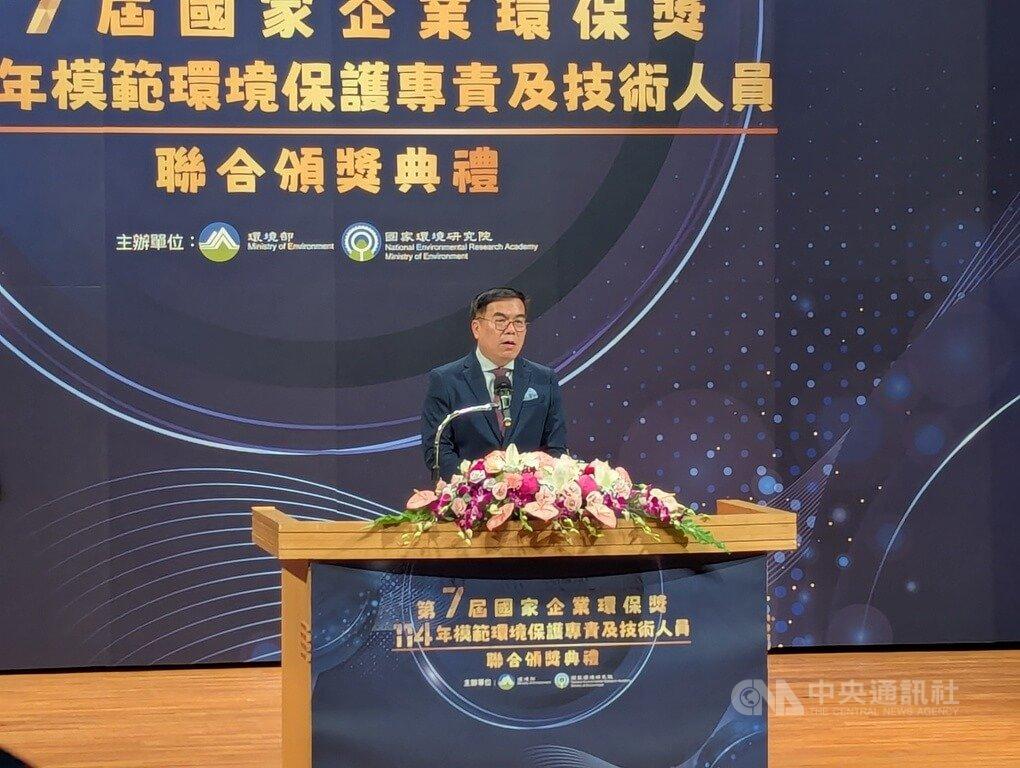The Ministry of Environment today gave environmental protection awards to 64 companies from diverse sectors spanning semiconductors, tourism, finance and healthcare.
The ministry hosted the seventh National Enterprise Environmental Protection Award ceremony in Taipei today.
The diversity of the awarded firms shows that sustainability has become a shared goal across industries, Minister of Environment Peng Chi-ming (彭啟明) said.

Photo: CNA
Of the 125 companies nominated, only 64 received awards after the judges carefully reviewed each one, he said.
In the past, environmental efforts focused on addressing pollution, but now there are added requirements for sustainability and achieving net-zero emissions, Peng said.
Regarding carbon fees, Peng said that 90 percent of companies required to pay the fee have submitted voluntary emission reduction plans and could enjoy discounted rates if approved.
In addition, 67 factories have applied for stricter carbon reduction targets equivalent to cutting 40 percent of emissions by 2030, which exceeds the national carbon reduction goal, he said.
However, while the government remains firm in its net-zero goals, recent events such as the US tariffs could severely impact companies, the minister said.
If a business suffers significant losses and meets the criteria for high carbon leakage, it would be eligible for carbon fee reductions, he said.
Taiwan may also face pressure from the EU’s Carbon Border Adjustment Mechanism in the future, but “negotiations are going smoothly” and some offsets are expected, he added.
Taiwan needs Taiwan Semiconductor Manufacturing Co (TSMC), and it also cannot go without its sanitation workers, he said, adding that environmental efforts used to focus on handling waste, but now focus on the circular economy.
Last year, the ministry signed a memorandum of understanding with TSMC to work on carbon capture and fully circular technologies, he said, adding that the ministry also plans to create fully circular industrial parks in the future.

The Chinese military has built landing bridge ships designed to expand its amphibious options for a potential assault on Taiwan, but their combat effectiveness is limited due to their high vulnerability, a defense expert said in an analysis published on Monday. Shen Ming-shih (沈明室), a research fellow at the Institute for National Defense and Security Research, said that the deployment of such vessels as part of the Chinese People’s Liberation Army (PLA) Navy’s East Sea Fleet signals a strong focus on Taiwan. However, the ships are highly vulnerable to precision strikes, which means they could be destroyed before they achieve their intended

The Taiwan Experience Education Program (TEEP) has funded short-term internships in Taiwan for more than 4,500 young people from more than 40 countries since 2015, with the goal of attracting and retaining international talent, the Ministry of Education said yesterday. Fifty-five colleges launched 514 projects this year, including in fields such as semiconductors, artificial intelligence, medicine and biotechnology, green energy, and sustainability, it said. The program provides research and practical internships in Taiwan for two to six months, and offers cultural exchange and networking opportunities, the ministry said. For example, National Formosa University’s Embedded System and Autopilot Laboratory developed two solar-powered drones in

GLOBAL: Although Matsu has limited capacity for large numbers of domestic tourists, it would be a great high-end destination for international travelers, an official said Lienchiang County’s (Matsu) unique landscape and Cold War history give it great potential to be marketed as a destination for international travelers, Tourism Administration Director General Chen Yu-hsiu (陳玉秀) said at the weekend. Tourism officials traveled to the outlying island for the Matsu Biennial, an art festival that started on Friday to celebrate Matsu’s culture, history and landscape. Travelers to Matsu, which lies about 190km northwest of Taipei, must fly or take the state-run New Taima passenger ship. However, flights are often canceled during fog season from April to June. Chen spoke about her vision to promote Matsu as a tourist attraction in

Taipei resident Mu Chu-hua caught some glimpses of China’s mighty military parade on YouTube on Wednesday. As she watched hypersonic missiles roll down Beijing’s Changan Avenue and troops march in lockstep, she did not feel like they posed a threat to Taiwan. Mu, a 69-year-old retiree, said she saw the parade as simply a way for Chinese President Xi Jinping (習近平) to “say thank you to the troops.” “I thought it was quite normal,” she said. “It was very cool.” China’s military parade commemorating the end of World War II was being watched internationally for insights into Beijing’s military advances and its show